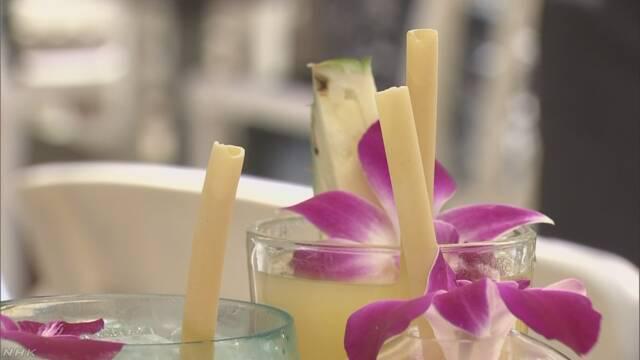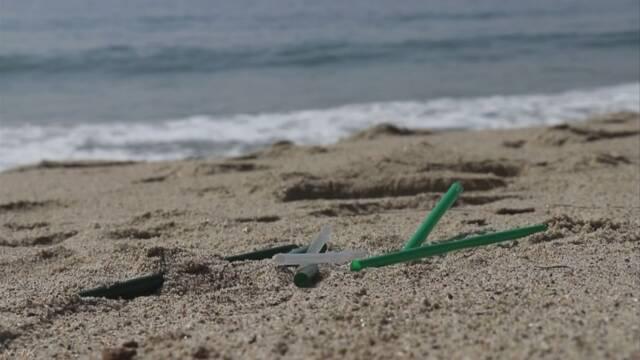Major fast food chains like Starbucks and McDonald's are now scrambling to come up with alternatives.
The famed beach capital of Malibu in California was the first to issue a total ban of single-use plastic straws on June 1st. You can now expect to get a paper straw with your Starbucks iced coffee there.
The city has also prohibited the use of plastic spoons and forks. First-time offenders can expect a 100-dollar fine, then 200 dollars for the 2nd offence, and 500 dollars for the 3rd.
The aim is to rid the ocean and beaches of throwaway plastic.
Mayor Rick Mullen says a ban by a well-known city like Malibu will help raise public awareness of the issue.
Local surfers say they see increasing amounts of plastic garbage drifting in the sea, and it's not unusual to find plastic straws washed up on beaches.
The west coast city of Seattle plans to introduce a similar plastic-straw ban in July. San Francisco and New York are also planning to follow suit.
Why the focus on straws?
Food vendors also use plastic cups and lids, so why are US cities focusing on plastic straws? One of the reasons is a video circulating online of a sea turtle with a plastic straw stuck up its nose.
An environmental group says 500 million plastic straws are used every day in the United States. That's 1.6 straws per person.
Conservationists say most of these straws are too small for recycling and end up in the ocean after disposal.
Plastic alternatives
A 20-year-old beachside cafe Greenmunch in Malibu stopped using plastic straws in April, two months ahead of the ban. It uses a bucatini pasta tube instead. The pasta goes soft when it's boiled, but it stays solid for about 4 hours in a cold drink.

Paradise Cove Beach Cafe owner, Robert Morris, says pasta straws are eco-friendly because they're bio-degradable. He says he came up with the idea one morning at 3 AM.
He says the cafe has already served more than 60,000 cold drinks with pasta straws and customers love them. He is importing an increasing number from Italy.
Other types of reusable straws are also being seen around town. They're made of glass, stainless steel and bamboo, but paper is being used the most.
Paper straw makers overwhelmed
The city of Malibu provided local food and drink businesses with hundreds of samples of paper straws. They were supplied by a manufacturer in Indiana and a Canadian company sourcing from China.
Both companies said they've since been flooded with inquiries from restaurants and bars.
At the Canadian firm, we watched the last box of straws being brought out for shipment. Owner Phillip Jacobsen seemed surprised at the jump in sales. "We sold as many straws in six weeks as we did in the six months prior to that," he said.
A plastic straw costs about 1 cent. A paper straw costs more than triple that because of the time-consuming process of winding paper.
Jacobsen says the cost won't undermine profitability as long as they only serve straws when customers ask for them.
Plastic straws banned in Britain
The campaign against plastic straws has been taking root elsewhere in the world. In February, Taiwan announced it would ban the straws from eating establishments next year, and Britain's Prime Minister Theresa May presented a ban plan in April, calling on other nations to follow suit.
Companies grappling with change
McDonald's and Starbucks introduced paper straws at their British outlets in May. Both companies announced plans to shift away from plastic at all their outlets in Malibu and Seattle, but how far they will go is up to them.
McDonald's shareholders met in Illinois on May 24th. Some urged management to prohibit the use of plastic straws at all outlets, pointing out that about 95 million straws are being used at some 36,000 outlets worldwide.
They said the failure to respond to this issue undermines corporate values and could cause the company to lose customers. But the proposal was rejected. Only about 8 percent of shareholders supported it.
However, public pressure is growing on McDonald's to take steps in the US similar to those it has taken in Britain.
Meanwhile, the hotelier Hilton announced on May 23rd that it will stop using plastic straws by year-end at its 650 hotels worldwide. Even companies not legally bound by a ban can no long ignore public concerns about throwaway plastic.
Opposing the bans
Not everyone agrees that plastic straws should be banned. Khalil Rafat, the owner of smoothie shop SunLife Organics in Malibu, says a thick straw is necessary to enjoy the sherbet-like drink.
He says paper straws on the market aren't strong enough and custom-made straws are too costly.
But Rafati will eventually have to switch to paper straws. He says he will do so even if he has to pass on the cost to customers. Lately, he's been serving smoothies without straws because he wasn't able to make the changeover by June 1st.
The California state legislature is discussing a bill that would allow restaurants to serve straws only if customers request them. Other US cities considering similar legislation see this as more practical.
Consumers will often grab a plastic straw wherever it's available. It's become a symbol of mass consumption and the disposable society.
Many restaurants in Japan continue to serve drinks with plastic straws. Milk and juice packs sold in stores often come with the straws attached.
Do we really need them?
